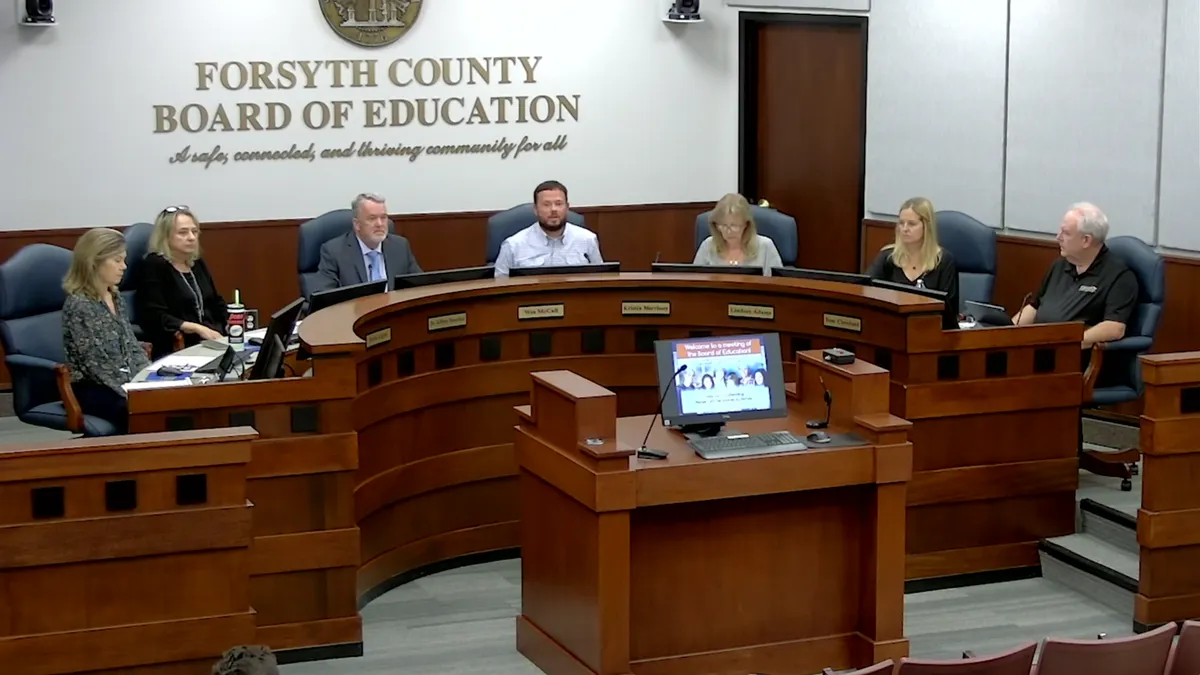In one of the first settled cases of its kind, the U.S. Department of Education has found Georgia's Forsyth County Schools' process of removing library books discriminated against students based on sex and race, violating both Title IX and Title VI.
While the department’s Office for Civil Rights discovered district emails saying books had been reviewed for sexual explicitness, and not LGBTQ+ content or moral dilemmas, some parent comments during a school board meeting still focused on removing books for reasons related to gender identity or sexual orientation, diversity and inclusion, and critical race theory.
Meanwhile, some students' comments at the board meeting focused on the gender identity, sexual orientation, race or color of authors or characters in the books being questioned, as well as on the impact of removing the books, according to case documents shared by OCR on Friday.
As a result of the OCR probe, the district agreed to post a statement including the parameters of its review process and its intention to promote diversity, among other things. The district willI also be required to administer a school climate survey and create a working group to address harassment concerns, under its May 19 resolution agreement with OCR.
What OCR found
Although a district committee review ultimately led to seven out of eight books being returned to library shelves, OCR found Forsyth County Schools knew its review process may have created a racially and sexually hostile environment for students that it did not take steps to address.
"Nonetheless, communications at board meetings conveyed the impression that books were being screened to exclude diverse authors and characters, including people who are LGBTQI+ and authors who are not white, leading to increased fears and possibly harassment," the OCR found in its investigation.
Students, for example, said at board meetings that they feared going to school and that the environment had become harsher, according to the OCR documents.
"One student stated that the book ban immediately made the environment more harsh for students; people like him who are not in the closet are watching their safe spaces disappear, and he is sick of being fearful at school," the OCR described.
More challenges on horizon
This case shows the Education Department has begun scrutinizing book bans or reviews by districts — and that districts can be found to have violated students' civil rights based on race and sex through their review processes and book removal decisions.
Many advocacy groups have warned in recent years that growing momentum for laws prompting the removal of books is creating hostile environments for students of color and LGBTQ+ students. They also warned that such laws — such as Florida's so-called "Don't Say Gay" — could violate civil rights laws, including Title IX, which the Biden administration interprets to protect LGBTQ+ students.
Despite its hardline stance, critics had called out the administration for not doing enough to protect LGBTQ+ students.
Now, it's possible that more civil rights cases involving district book bans are in the pipeline, considering the record number of OCR complaints logged last year included a majority related to Title IX discrimination. Complaints around racial hostility in schools have also reached a notably high volume, said OCR Assistant Secretary Catherine Lhamon in an April interview with K-12 Dive.
Last year, the Education Department said it was investigating after a complaint from the American Civil Liberties Union about a superintendent from Texas' Granbury Independent School District who was recorded telling school librarians to remove LGBTQ-themed books, according to The Texas Tribune.
Parents and students are not only taking the OCR avenue to log civil rights complaints, but are also pursuing legal action to appeal districts' book ban decisions.
Last week, for example, parents joined publishing giant Penguin Random House in a lawsuit claiming a Florida district violated their First and 14th Amendment rights when it decided to remove books.
Meanwhile, book bans continue to multiply.
According to PEN America, a free speech organization that tracks curriculum restriction laws and book bans, the rate of books being removed this school year is outpacing 2021-22. An April report from the organization showed 1,477 instances of individual books banned during the first half of this school year, up from 1,149 book bans recorded in spring 2022.













